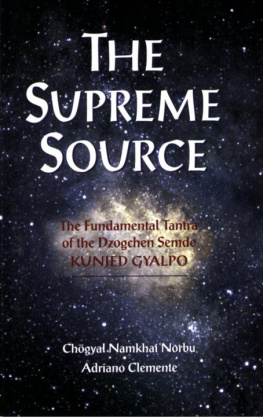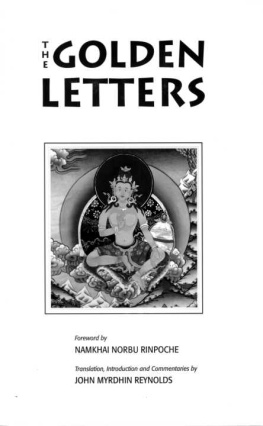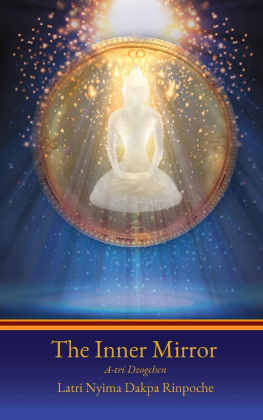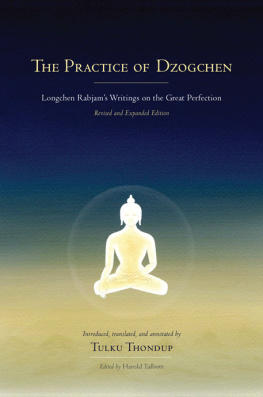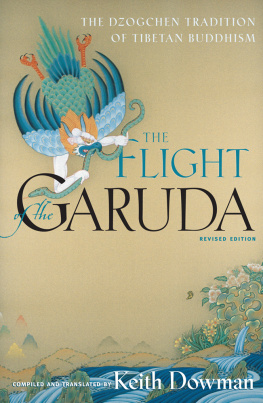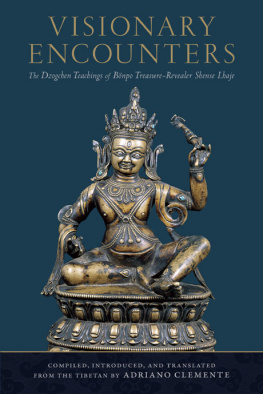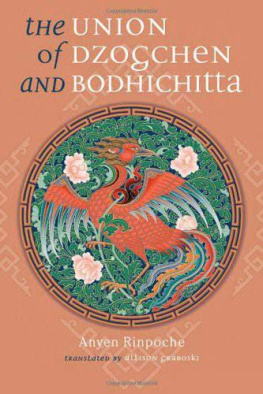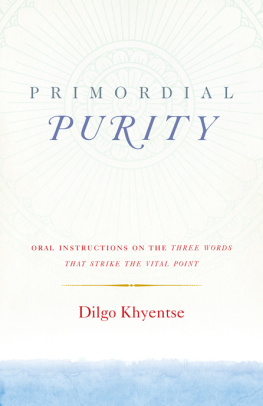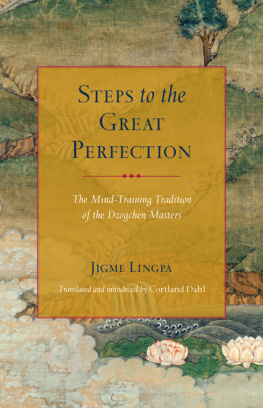THE SUPREME SOURCE
The Kunjed Gyalpo
The Fundamental Tantra of Dzogchen Semde
THE SUPREME SOURCE
The Kunjed Gyalpo
The Fundamental Tantra of Dzogchen Semde
Chogyal Namkhai Norbu Adriano Clemente
Translated from Italian into English by Andrew Lukianowicz





TABLE OF CONTENTS
Reading the Kunjed Gyalpo you will often come across the word "I": "I am the nature of all phenomena," "I am the root of existence," and so on. This "I" is your true state: the primordial Buddha, the supreme source of manifestation. Try to understand the meaning of Kunjed Gyalpo reading it in this light.
-Chogyal Namkhai Norbu
FOREWORD
The Kunjed Gyalpo (Kun byed rgyal po)' can be considered the fundamental tantra of Dzogchen, a teaching that according to tradition has been transmitted for over two thousand years from teacher to disciple. Its aim is to awaken each individual to his or her true nature: the primordial state of enlightenment, which can be compared to a mirror on whose surface the multiplicity of the phenomena of existence is reflected. Introducing this knowledge is the teacher's task, while understanding it deeply and integrating it into one's existence is the disciple's task: only when this has been accomplished do the traditional texts becoming living words, precious pointers along the timeless journey towards the supreme source.
Dzogchen, in fact, can be deemed the pinnacle not only of all the Buddhist paths of realization, as has often been asserted by Tibetan teachers, but also of the various spiritual methods and teachings of other traditions. The aim of each path, either directly or indirectly, is to overcome the dualistic condition in order to attain the ineffable dimension of the absolute: precisely this dimension is the primordial state to which the true Dzogchen teacher introduces the disciple.
It was this fact that inspired me to make available, albeit not in its entirety, to readers interested in the spiritual quest in general and in Tibetan Buddhism in particular, a basic text of Dzogchen: the Kunjed Gyalpo, or All-creating King. Rendered "Supreme Source" in the present work, it is a tantra whose title comprises simultaneously the meanings of the teacher, of the primordial state communicated by the teacher to the disciple, and of the knowledge that blossoms in the latter. The choice of this text, which in its present version derives from the eighth century but whose origin may be far more ancient, is also due to its universal message, which places it among the great spiritual scriptures of all the ages, comparable to classics such as the Bhagavad Gita.
The present work is structured in three parts. The first part describes the origin and basic principles of Dzogchen as stated in the traditional texts of the Dzogchen Semde, of which the Kunjed Gyalpo is the fundamental scripture. A large part of the material is drawn from the Vairo Drabag (Bai ro 'dra 'bag), the biography of the great Tibetan teacher and translator Vairocana, who introduced the Semde and Longde series' of Dzogchen from India and Oddiyana to Tibet in the eighth century. In fact, the first five chapters of this biography constitute a veritable history of the origin of Dzogchen.
The second part of this work consists exclusively of oral teachings given by Chogyal Namkhai Norbu: a brief introduction to the fundamental aspects of Tantraz and Dzogchen, followed by a succinct exposition of the most salient points of each of the eighty-four chapters of the Kunjed Gyalpo. These teachings were given by Chogyal Namkhai Norbu in Sardinia at the end of 1977 and the beginning of 1978, when he gave the transmission of and an oral commentary to this tantra. Readers who are not familiar with Tibetan Buddhism are advised to first read the chapter on "The Fundamental Principles of Tantra and of Dzogchen." However it would be useful for readers to have at least some general knowledge of Hinayana and Mahayana Buddhism.
The third and last part contains extracts from the Kunjed Gyalpo selected to enable readers to approach the extraordinary message of this text yet avoiding plunging them into details that are difficult to understand without a certain knowledge in the various fields within sutra and tantra. The Kunjed Gyalpo is a text committed to writing primarily for the benefit of Buddhist practitioners, and consequently its language and terminology are largely those of sutric and tantric Buddhism. It is important to bear this in mind while reading this text.
In all the gnostic traditions, the absolute is the equivalent of the ineffable, of that which transcends word and thought. For example, a famous invocation by Jigmed Lingpa reads that "even the Buddha's tongue is weak to explain this point [i.e., the absolute condition]."' This does not mean, however, that words have no value. Since ancient times, knowledge of Dzogchen has been communicated by means of three types of transmission: direct, that is, from mind to mind; symbolic, through the use of gestures, objects, or riddles; and oral, through spoken language. Nubchen Sangye Yeshe, one of the first Tibetan teachers of Dzogchen, wrote: "Just as to look for gold in the dark we need a lamp, so to discover the true meaning [of the absolute] in one's mind and to cultivate recognition of it we need the lamp of words and scriptures to shed light for us.... 'The lamp of names and of words illuminates the gold of true meaning,' states the Supreme Peak."4
This work is dedicated to the spread of the Dzogchen teachings in the West, with the hope that future generations too might have the good fortune to meet a living source of knowledge such as the teacher Chogyal Namkhai Norbu, the true Kunjed Gyalpo, has been and still is for me.
Adriano Clemente
June 1996
This edition of The Supreme Source has been revised and partially enlarged from the original Italian edition published in 1997.

Chogyal Namkhai Norbu
Photo by Liane Graf
PREFACE
The fundamental scriptures of the Dzogchen teachings are divided into three categories, called gyud, lung, and mennag.
The gyud, or tantras, are texts that explain the fundamental principle of the teaching of "total primordial perfection" or Ati Dzogpa Chenpo in its entirety, presenting fully the three key points of the base, the path, and the fruit.
The lung' may form part of a tantra, summarizing its essential point or emphasizing or elucidating a specific aspect in relation to the base, the path, or the fruit.
The men nag, or upadesa, are extracts containing special instructions for practices related to the specific points of the base, the path, or the fruit of Ati Dzogpa Chenpo, in extensive or concise form, or they may be texts of instructions derived from the personal experience of realized teachers, written expressly for the benefit of future generations and marked with the seal of secrecy.
The meaning of the word "tantra" is "continuity" or "without interruption," and refers to the condition of infinite potentiality and of uninterrupted manifestation of the energy of our primordial state. The tantras are so called because their express function is to enable one, directly or indirectly, to understand clearly this natural state.

